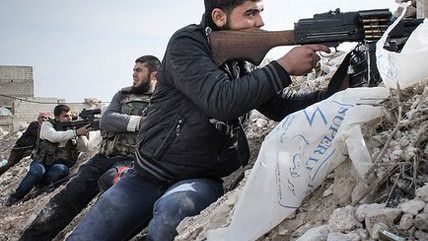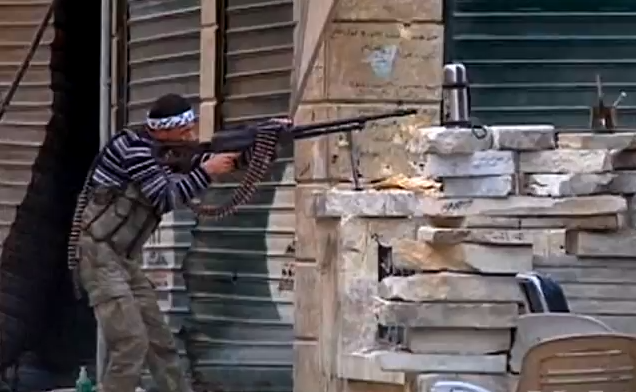Islamic Militants Are Sidelining Moderate Rebels in Syria


Islamists fighting against the Assad regime in Syria are increasingly sidelining other rebels, who in many cases are not as well equipped or as funded as jihadists like Jabhat al-Nusra.
In an article published today at Reuters Oliver Holmes and Alexander Dziadosz highlight the effect that that the increasing influence of jihadist fighters is having on the conflict in Syria:
(Reuters) - As the Syrian civil war got under way, a former electrician who calls himself Sheikh Omar built up a brigade of rebel fighters. In two years of struggle against President Bashar al-Assad, they came to number 2,000 men, he said, here in the northern city of Aleppo. Then, virtually overnight, they collapsed.
Omar's group, Ghurabaa al-Sham, wasn't defeated by the government. It was dismantled by a rival band of revolutionaries - hardline Islamists.
The Islamists moved against them at the beginning of May. After three days of sporadic clashes Omar's more moderate fighters, accused by the Islamists of looting, caved in and dispersed, according to local residents. Omar said the end came swiftly.
The Islamists confiscated the brigade's weapons, ammunition and cars, Omar said. "They considered this war loot. Maybe they think we are competitors," he said. "We have no idea about their goals. What we have built in two years disappeared in a single day."
The group was effectively marginalized in the struggle to overthrow Syria's President Bashar al-Assad. Around 100 fighters are all that remain of his force, Omar said.
It's a pattern repeated elsewhere in the country. During a 10-day journey through rebel-held territory in Syria, Reuters journalists found that radical Islamist units are sidelining more moderate groups that do not share the Islamists' goal of establishing a supreme religious leadership in the country.
The moderates, often underfunded, fragmented and chaotic, appear no match for Islamist units, which include fighters from organizations designated "terrorist" by the United States.
Recently the Obama administration said that it would send military aid to rebels in Syria, a move that some fear could see weapons fall into the hands of Islamists, whose increased popularity can be attributed in part to the social services they are providing.
The Reuters article points out that Western officials plan for military aid to be passed through the Supreme Military Council, an organization that still lacks credibility. The head of the Supreme Military Council, Gen. Salim Idriss, has said that there is no chance weapons will find their way to Islamists like Jabhat al-Nusra, despite not having much control of the situation on the ground or of the rebels themselves.
Yesterday, G8 leaders backed plans for a peace conference on Syria. Given that Islamists are sidelining moderates it is hard to see how effective a peace conference could be. It is not as if Al Qaeda-linked fighters are going to consider whatever proposals come out of any peace conference as legitimate or binding, especially consider that they have ambitions beyond Assad's removal.


Show Comments (7)